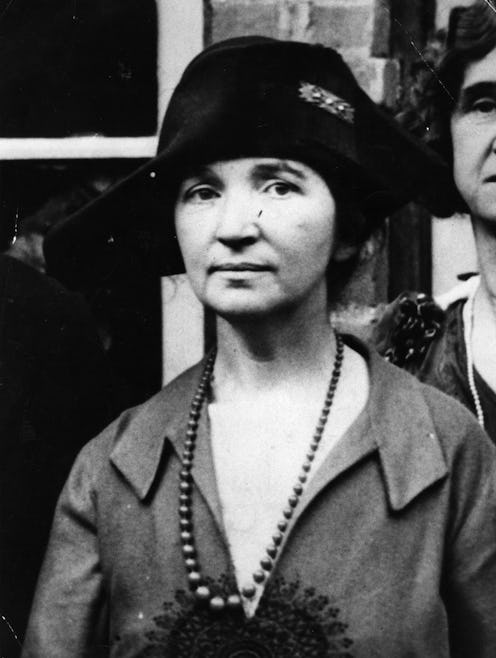News
Here's What Margaret Sanger Said About Eugenics
As Planned Parenthood celebrates its 100th birthday, it's not surprising that controversy has once again engulfed its founder. The legacy of the women behind Planned Parenthood is indeed a complicated one, but was Margaret Sanger the eugenics villain conservatives claim her to be?
The fact that Planned Parenthood is celebrating 100 years of service is huge if you consider the fact that Sanger opened America's first birth-control clinic four years before women even had the right to vote and more than 20 years before the federal government lifted its ban on contraception. As wonderful as it would be to say things got easier for the nonprofit organization when contraception was legalized in 1938, conservatives continue to attack Planned Parenthood's reputation and funding as a means to curb its efforts to provide women with a variety of reproductive health services.
While many see Sanger as a fierce champion of reproductive rights — and thus the women's rights movement — several conservatives continue to try and reframe Sanger's work with Planned Parenthood as an attempt to "kill black babies." In petitioning to have a bust of Sanger removed from the Smithsonian's National Portrait Gallery in 2015, 25 House Republicans (among them Sen. Ted Cruz) argued Sanger advocated for "the extermination of groups of people she deemed as 'undesirables.' Specifically ... African-Americans."
It was hardly the first time a conservative politician had taken aim at Sanger. In 2011, then GOP presidential hopeful Herman Cain alleged that in opening the first birth-control clinic, Sanger's true goal was "preventing the increasing number of poor blacks in this country by preventing black babies from being born."
Those who paint Sanger as a racist who was intent on reducing the country's African American population often use a section of a 1939 letter Sanger wrote to leaders of the black community in an effort to respond to suspicions and garner support for clinics she planned to open in the South. "We do not want word to go out that we want to exterminate the Negro population, and the minister is the man who can straighten out that idea if it ever occurs to any of their more rebellious members," Sanger wrote.
Yet, when not taken out of context, the line isn't representative of Sanger's goals, it's representative of the false charges she feared could be brought against her given the controversial nature of contraception use in that era. For Sanger, contraception was a means to empower women of all social and economic classes and ensure their "right to life and liberty" by enabling them to choose if and when they had children. Furthermore, as the Washington Post pointed out in 2011 "a number of doctoral dissertations have closely examined the early days of Planned Parenthood and its relationship with the African American community, and found nothing to confirm these allegations."
It's true that Sanger did support the now totally unfathomable eugenics movement, which aimed to use selective breeding to improve the genetics of a population. "The most urgent problem today is how to limit and discourage the over-fertility of the mentally and physically defective," Sanger reportedly wrote in an article published in the Birth Control Review in 1921. However, it's important to note that at the time, the eugenics movement was much less controversial than the contraceptive movement and enjoyed fairly widespread acceptance.
However misguided some of Sanger's statements may appear today, it's hardly reason to condemn or defund an organization so integral to affordable health care and reproductive rights. The organization's statement in 2011 stands just as true today as it did then: "Planned Parenthood has a long history of condemning racism and opposes discrimination in all forms," Veronica Byrd, Planned Parenthood's director of African American media told the Washington Post.
"Margaret Sanger worked for social and racial justice at a time when segregation was the law of the land. She was invited by African American leaders to help provide health care to women in the African American community and her work was praised by Dr. Martin Luther King, Jr. For all her positive work, Margaret Sanger made statements some 80 years ago that were wrong then and are wrong now. Those statements have no bearing on the high quality health care Planned Parenthood provides today."
